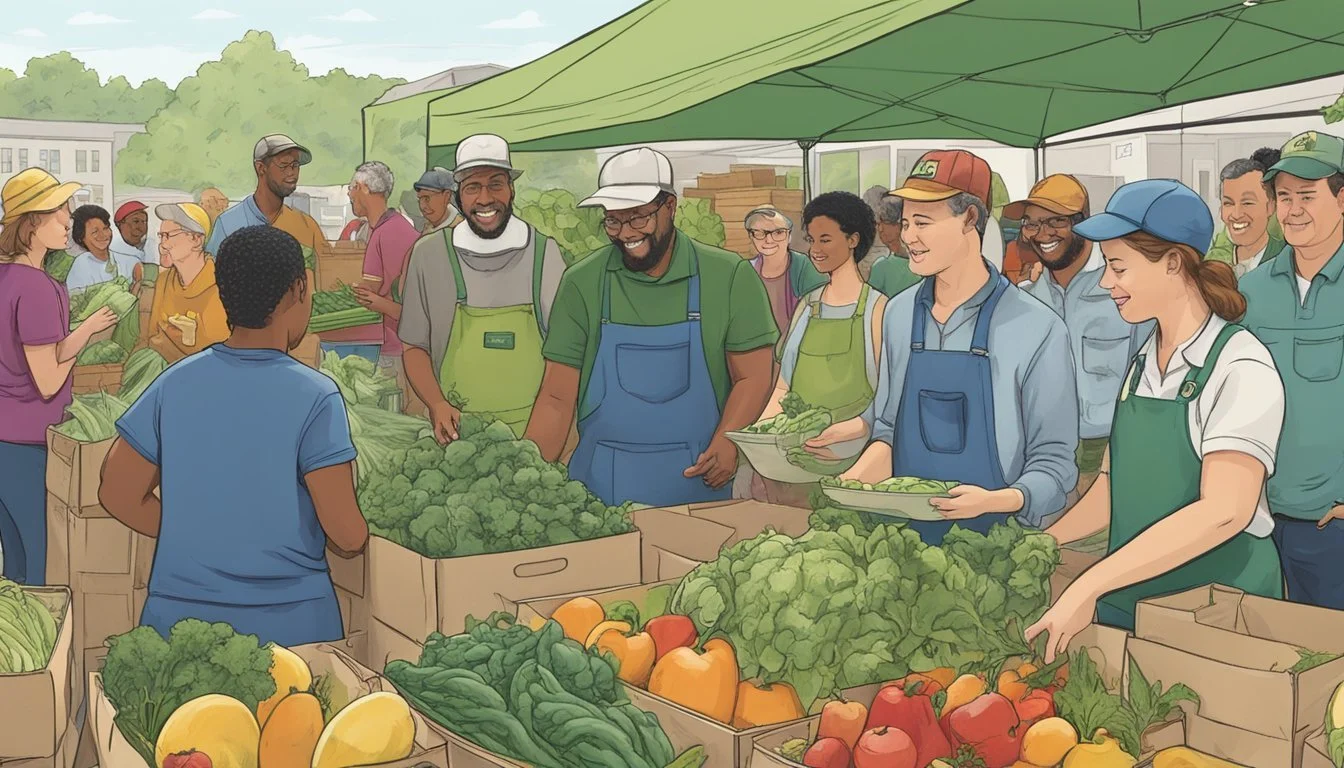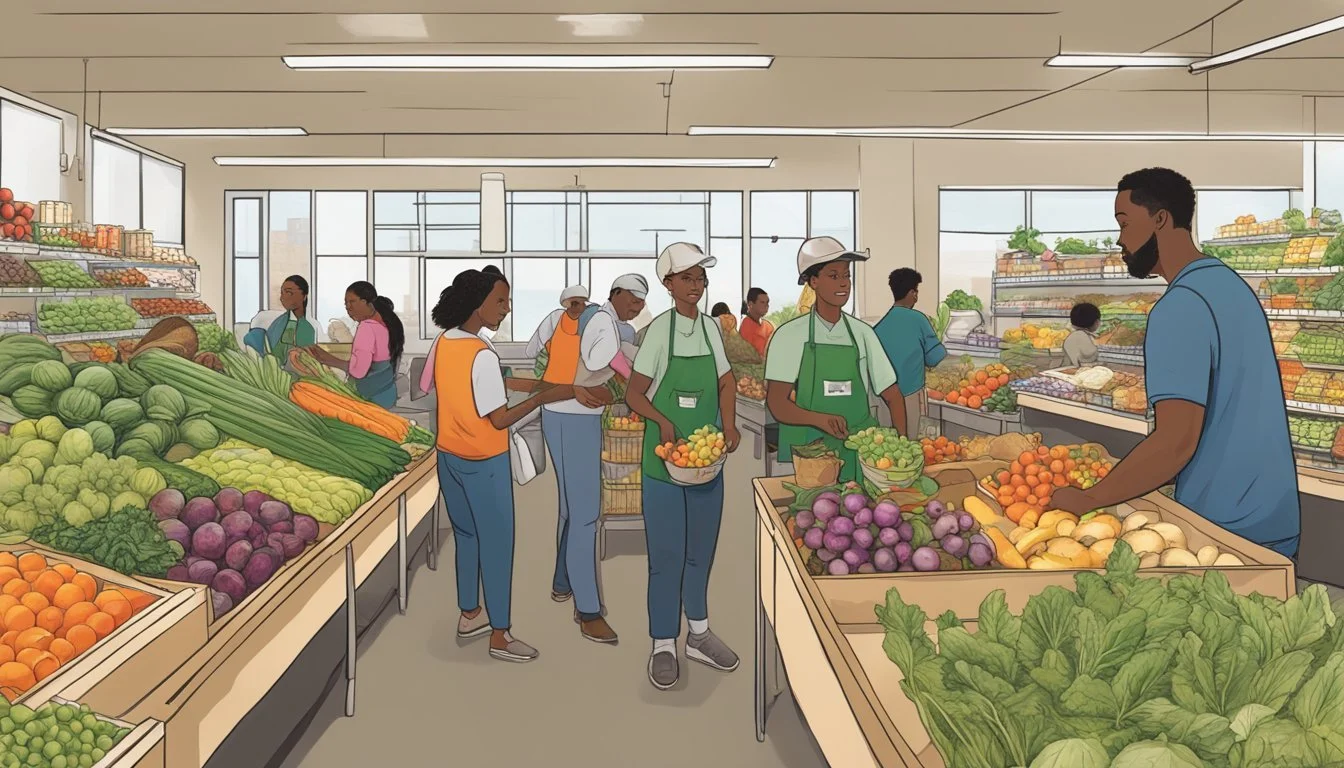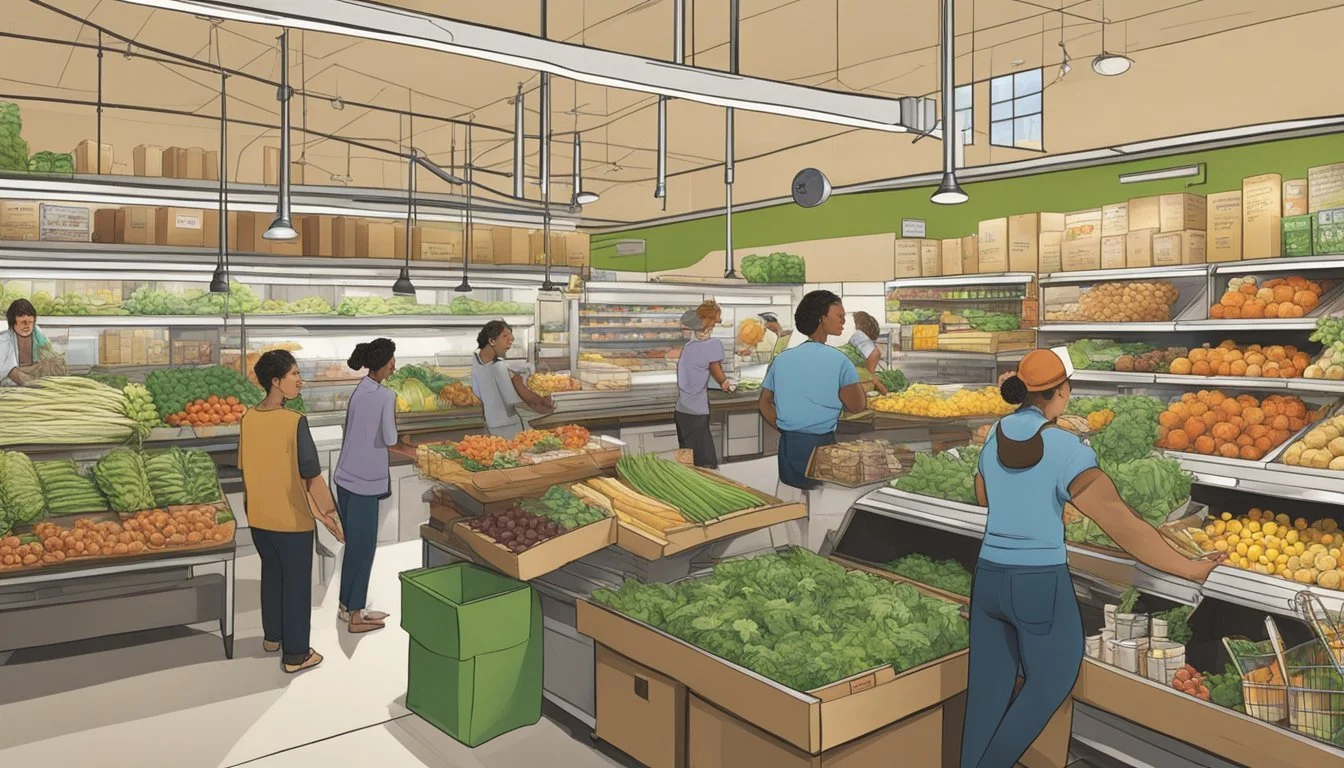Guide to Food Co-Ops in New Haven, CT
Your Local Shopping Resource
Food cooperatives, commonly known as food co-ops, have a unique place in the landscape of New Haven, Connecticut's food scene. Emphasizing community ownership and local sourcing, these cooperatives operate differently from traditional grocery stores. They are democratically controlled by their members and focus on providing high-quality food produced in a responsible and sustainable manner. In New Haven, a city with a rich history of activism and community engagement, food co-ops serve not only as sources of nutritious food but also as centers for community building and education about food justice and sustainability.
The history of food co-ops in New Haven reflects the city's vibrant community spirit and its shifting economic narratives. While a larger food co-op once thrived in the Kimberly Square neighborhood, it eventually closed in the early 1980s after years of serving the community. Since then, the desire for a cooperative food scene in New Haven has persisted, capturing the interest of those who value the sense of togetherness and shared mission that food co-ops foster. Despite past challenges, New Haven's residents continue to show interest in cooperative models as a solution for providing access to fresh, healthy foods, especially in areas that may lack them.
Today's food co-ops in and around New Haven offer a variety of options for members and non-members alike, including seasonal farm stands and markets that underscore the region's agricultural richness. These markets not only supply locally grown produce but also often act as pickup locations for community-supported agriculture (CSA) programs. This connection to local farms not only supports the regional economy but also reduces the environmental impact of long-distance food transport. With a focus on sustainability, community empowerment, and access to healthy food, New Haven's co-ops align with the city's broader goals and values.
History of Food Co-Ops in New Haven, CT
Food cooperatives have played a dynamic role in New Haven's history. They began as a solution to economic challenges and evolved into community-centric institutions.
The Roots of Cooperative Movement
The cooperative movement, aimed at creating economically efficient means of buying and sharing food among families, began to take shape in New Haven towards the end of the 1960s. Jeff Kilbreth, a New Haven resident, was pivotal in organizing the first known food co-op in the city. It started small, with just a few families collaborating as a buyer's club. As the city faced the same economic and social shifts that influenced the wider cooperative movement, these early New Haven co-ops became a vital resource to the community.
Evolution of New Haven Co-Ops
By the 1970s, the New Haven Food Co-Op had expanded, indicating a growing interest and need within the community. The co-op that originated in the Kimberly Square neighborhood soon outgrew its initial space and relocated to what later became known as Minore's market on Whalley Avenue. However, in the early 1980s, the larger New Haven food co-op closed down. While the specific reasons for its closure could be numerous, the decline could reflect broader economic trends and shifts in consumer habits that affected food co-ops nationwide.
Despite the closure of this central co-op, the spirit of cooperative purchasing has not disappeared from New Haven. The city, known for its resilience and community focus, continues to explore and embrace various iterations of the co-op model in the 21st century, adapting to the needs and preferences of modern consumers.
Understanding Food Co-Ops
In New Haven, food co-ops serve as a cornerstone to community nourishment and economic collaboration. These member-owned cooperatives prioritize local food security and shared ownership.
What is a Food Co-Op?
A food co-op is a member-owned grocery organization where the control and benefits are equally shared among its members. Members of the co-op have a say in the operational aspects and collectively make decisions that influence the sourcing and types of products offered. Food co-ops often focus on providing organic, locally sourced, and ethically produced goods. Through ownership, members invest in the co-op's success, fostering a strong sense of community involvement.
Benefits of Joining a Co-Op
Joining a food co-op in New Haven offers several benefits:
Community Connection: Members become part of a community striving for sustainable food practices and supporting local producers.
Economic Efficiency: The collective buying power of the co-op can lead to better prices for high-quality products.
Democratic Ownership: Each member has a voice in decision-making processes, enhancing the responsiveness to member needs and preferences.
Local Focus: Co-ops prioritize local farmers and producers, which helps to strengthen the local economy and reduce environmental impact.
By participating in a food co-op, individuals contribute to a more resilient food system while gaining access to healthful and locally grown food.
Local Food Co-Ops in New Haven
New Haven is home to a community-focused approach to grocery shopping with its local food co-operatives. These co-ops not only provide access to fresh, locally-sourced produce but also embody the spirit of community and shared ownership.
Willimantic Food Co-Op
The Willimantic Food Co-Op, situated within the Greater New Haven area, offers a wide range of local food options. Members have a say in the operation of the co-op, ensuring that the selection of products reflects the community's needs and values. This cooperative environment promotes local farmers and producers, fostering a sustainable food economy.
Fiddleheads Food Co-Op
Fiddleheads Food Co-Op represents another hub for local food in the region. With an emphasis on organic and natural foods, Fiddleheads serves as a testament to New Haven's commitment to health-conscious and environmentally responsible food choices. This co-op is a keystone for residents seeking to support local growers and enjoy high-quality produce.
These co-ops are more than grocery destinations; they are integral parts of New Haven's local food fabric, championing the importance of food origin and quality while nurturing the local economy.
Economic Benefits of Food Co-Ops
Food co-ops in New Haven provide tangible economic benefits to their local communities by supporting local economies and advancing sustainable food systems.
Impact on Local Economy
Local food co-ops like the one previously operational in New Haven's Kimberly Square are integral to community wealth-building. They help keep money circulating within the local economy by offering marketplaces for local producers. By prioritizing local goods, they offer a significant revenue stream for neighborhood suppliers and often provide work opportunities for area residents. Emphasizing local sourcing also allows co-ops to invest in community development financial institutions, which further supports community entrepreneurship and economic development.
Sustainable Food System
Food co-ops contribute to creating a sustainable food system by prioritizing environmentally regenerative practices and promoting healthful and sustainable foods. They are often at the forefront of environmental stewardship, aiming to reduce ecological footprints through responsible sourcing and reducing waste. In comparison to conventional retailers, food co-ops often outperform in environmental measures, which is reinforced by collective initiatives such as those by the National Co+op Grocers to amplify positive impacts on national food systems.
Community and Social Impact
Food cooperatives in New Haven, CT, are strengthening the local community by fostering active participation and empowering residents through mutual ownership. These co-ops serve as a viable solution to food deserts while contributing to social equity.
Community Involvement
Community gardens and partnerships with local organizations in New Haven have been instrumental in mobilizing volunteers and enhancing neighborhood cohesion. The initiatives led by food co-ops encourage farmers, gardeners, and local volunteers to actively engage in addressing food security. By participating in food co-op activities, members of the New Haven community contribute to a sustainable food distribution system that prioritizes local needs and resources.
Social Empowerment through Ownership
Food co-ops in New Haven offer the community not just access to nutritious food but also the chance to gain ownership in the local food system. This model of cooperative ownership enables community members to have a direct stake in the co-op’s success. It empowers the members to influence decisions, ensuring that the co-op aligns with their social and economic values. Through this empowerment, co-ops are creating more equitable opportunities for the people in New Haven to drive positive change in their food environment.
How to Participate in a Food Co-Op
Participating in a New Haven food co-op allows individuals to become more than customers; they become part of a community focused on sustainable food practices. They can engage by becoming an owner/member and through various volunteer opportunities.
Becoming an Owner/Member
To become an owner or member of a New Haven food co-op, an individual typically buys a share or equity investment in the cooperative. This investment conveys a sense of ownership and entitles the member to certain benefits, such as:
Voting rights on important decisions
Eligibility for dividends or patronage refunds based on the co-op's profitability and the member's purchases
Ownership is open to all, allowing for diverse community participation and fostering a democratic approach to business.
Volunteer Opportunities
Food co-ops often thrive on member participation, and many co-ops in New Haven provide a spectrum of volunteer opportunities that allow members to contribute their time and skills. Volunteering is a great way to engage with the co-op community and can include activities such as:
Assisting with events and workshops
Helping with daily operations, like stocking shelves or inventory management
Serving on committees or the board of directors, if eligible
Through volunteering, members support the co-op's mission and ensure its continued success and service to the community.
Comparison with Traditional Grocery Stores
Food cooperatives, or food co-ops, in New Haven distinguish themselves from traditional grocery stores through their sourcing of products and their ownership models. They focus on providing fresh and healthy options directly supported by a community-driven system.
Food Co-Ops vs. Grocery Stores
Product Sourcing:
Food co-ops often emphasize locally sourced goods, which supports regional farmers and producers. Grocery stores may offer locally grown products but generally also stock a significant variety of national and international brands. Co-ops usually prioritize fresh, whole foods, fostering a direct connection between the consumer and local food systems.
Local Products: Co-ops typically have a higher percentage of locally sourced items.
Seasonal Offerings: Co-ops are more likely to offer seasonal products reflecting regional harvests.
Ownership and Governance:
One of the key differences is ownership. Co-ops are owned and democratically governed by members who use their services, while grocery stores are usually owned by individuals, corporations, or shareholders who may not be directly involved in daily operations.
Member Involvement: Co-op members can vote on important decisions and influence product selection.
Profit Distribution: Profits in co-ops are often reinvested into the store or distributed among members, unlike grocery stores where profits benefit owners or shareholders.
Health and Wellness:
Health is a central focus for food co-ops. They cater to consumers looking for organic, non-GMO, and minimally processed foods. Traditional grocery stores carry healthy options but also a wide range of processed foods.
Product Labels: Co-ops rigorously label health-related attributes of food.
Educational Resources: They commonly provide literature and programs to educate members on healthy eating.
Economic Impact:
Co-ops typically reinvest profits back into the local economy, support local jobs, and engage in community development. Grocery stores may also contribute to the local economy, but their financial structure may direct profits elsewhere.
Community Support: Co-ops often participate in local community events and support food-related initiatives.
Local Economy: They tend to keep financial resources circulating within the community.
Supporting Education and Outreach
In New Haven, CT, food co-ops not only provide access to local and organic produce but also contribute significantly to community education and outreach. By organizing a variety of workshops and events, these co-ops foster a well-informed consumer base that understands the importance of local and sustainable food systems.
Workshops and Events
Food co-ops in New Haven frequently host workshops and events designed to educate members and the public about food-related topics. Topics can range from:
Organic food production
Nutritional information
Sustainable agricultural practices
Cooking and food preparation techniques
These educational initiatives serve to empower individuals with the knowledge to make healthier food choices and support local producers. The co-ops' role extends beyond retail to becoming a hub for community learning and engagement in food-related issues.
Challenges and Future of Co-Ops
In New Haven, food co-ops face an array of financial challenges, yet they stand at the cusp of significant evolutions with social investors playing a key role in shaping their future.
Financial Challenges
Food co-ops often operate with thin margins and face intense competition from traditional grocery stores and online food retailers. Accessing capital for start-up and growth can be a hurdle, as they typically rely on member investments and loans. They must balance maintaining affordable prices with covering operational costs.
Looking to the Future
The future for food co-ops looks promising as social investors are increasingly interested in supporting businesses with a positive community impact. Co-ops are uniquely positioned to leverage this trend due to their focus on community development and sustainable practices. To ensure their growth and sustainability, co-ops must adapt innovative business models that cater to evolving consumer behaviors and values.









